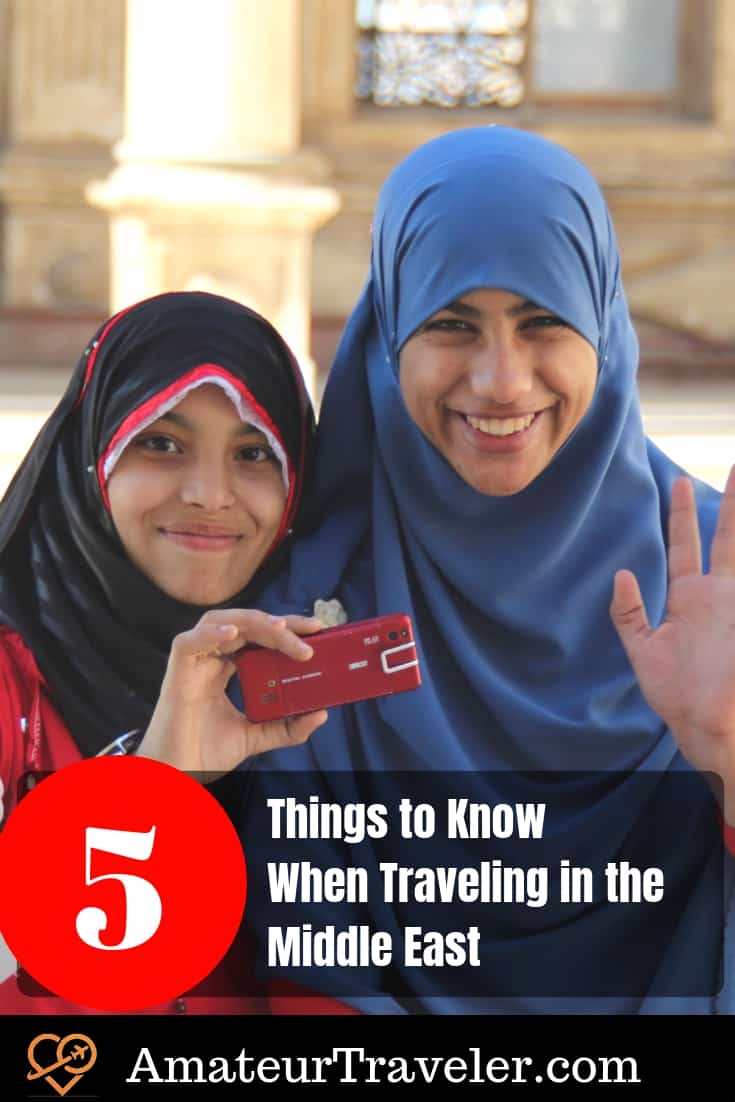
While standards vary from country to country the Middle East is culturally defined by being predominantly Islamic, and by most of its countries being ruled under Islamic law. This means that we need to be aware of a few things about customs and culture if we want to avoid drawing unwanted attention on the street or possibly even from the government. Additionally, recent conflicts mean that travelers should take extra precautions when traveling through high-risk areas.
1. Dress code
Just about everyone is aware that women dress very conservatively in the Middle East and don’t interact with men if they can help it. Depending on the country it would be considered unseemly to even be walking in the street without a man. Few people seem to be aware that this is often also expected of visitors. Showing up in a crop top and shorts is less of a daring stand for women’s rights than it is extremely disrespectful, dangerous, and even illegal if you decided to do something like that in the wrong country. Some places like Saudi Arabia require visitors to be “fully dressed” meaning everything including the face must be covered. Others like Turkey are lax and fairly secularized, and still others like Oman are conservative but don’t expect visitors to conform to their standards.
2. Behavior in Public

3. Address people formally
In America, we pride ourselves on our informality and easygoing attitude. This does not apply in the Middle East. Address people by their title and last name. Don’t use their first name unless you are explicitly permitted to do so. Also, don’t do hugs, affectionate slaps on the shoulder, high fives, or any other “chill” quintessentially American greeting unless you know for certain that it will be well received. A firm handshake will get you a lot further.
4. Watch what you’re taking pictures of
A lot of Middle Eastern governments like Syria, Saudi Arabia, or Yemen are not incredibly trusting of Americans snapping pictures of military facilities. If you’re not sure what a building is for it is better not to pull out your camera. Usually, the most interesting architecture will be mosques, monuments, or works of art anyway, so don’t invite trouble where you can avoid it. If someone catches you the trouble could be as minor as getting you to delete the picture, to taking your camera, to taking you to jail for questioning.
While these might make the Middle East sound kind of scary to visit you should not be deterred. If you are properly prepared and do your research on how you should present yourself in your destination country you will discover wondrous things as you explore the cradle of human civilization. Remember to blog about your travels and write guest posts for travel websites like this one so the rest of us can find your stories!
- Get a Car Rental
- Book Your Accommodation HERE
- Search for Great Tours HERE
- Buy Travel Insurance
One Response to “4 Things to Know When Traveling in the Middle East”
Leave a Reply
Tags: article, travel tips

 Places to Visit in Jordan beside Petra
Places to Visit in Jordan beside Petra

Simon
Says:July 30th, 2012 at 9:54 am
Thanks for the excellent advice! Now I know my nudist lifestyle would not be welcome in the Middle East (I joke!). It’s fairly similar travelling through South East Asia but I’d imagine it’s even more important to adhere to these guideline in the ME.